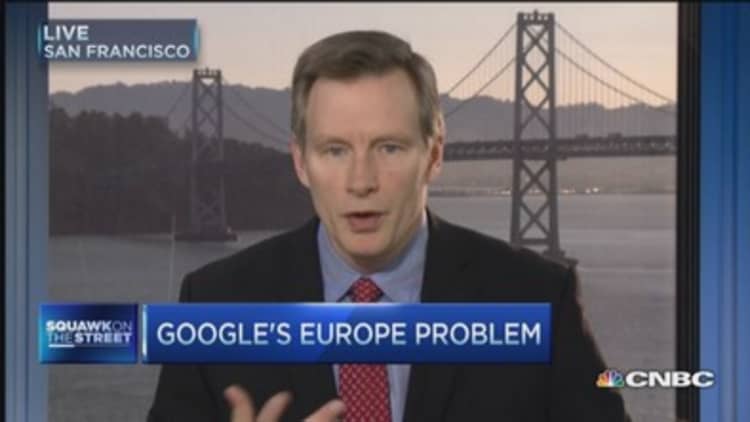Google could be forced to change how it displays its search results in Europe if regulators get their way, and that could impact the company's bottom line. (Tweet This)
"As Google looks to grow by launching more products, it will no longer be able to take for granted its access to the market and will need to compete for search rankings just like everyone else," said Randy Giusto, vice president and analyst at Outsell.
"With several recent product flops, ultimately this could be good for Google as well as consumers, as the search giant will be forced to up its game."
The gist of the EU's charges come down to that it believes Google is unfairly favoring its own search results over competitors. For example, consumers shopping for "smartphones" will see Google Shopping results on the top of the page above Amazon results. Same for someone searching, say, for a flight. The user would see the Google Flights search service show up above other travel search engines like Expedia.
Read More Is 'clueless' Europe going to destroy Google?
Even if EU regulators rule against Google—which is not guaranteed at all—how could they enforce it?
A "theoretically possible" solution would be forcing the company to rank services "impartially" in search results, wrote James Cordwell, an analyst at Atlantic Equities, in a report. But "auditing this arrangement could be difficult and resource-intensive, something both Google and the EU may be keen to avoid."
"This auditing issue could be addressed by forcing Google to split into separate search and publishing arms, but this would seem unduly draconian and politically challenging," Cordwell said.
Google is no stranger to the EU's tougher regulatory environment, but the latest charges could weigh more heavily on the company if it is forced to make significant changes to how its search engine works.
"This has been an overhang on Google's stock for the last three to four years, so it's not a surprise in terms of a catalyst itself, but now it's an official catalyst, an official overhang," said Mark Mahaney, an analyst at RBC Capital Markets, on CNBC Wednesday.
"But there are fundamental issues this raises for Google. If there's a change in business practices with their algorithms in trying to perfect customer satisfaction on the page, if someone is going to step in and try to regulate that ability away that should be a negative for Google long term," he said.
Big changes

The EU's chief competition chief, Margrethe Vestager, said Wednesday that the bloc does not want to interfere with the company's screen design or algorithm. Rather, she said the EU wants to make sure that consumers are getting the best comparison shopping results.
This means that Google would still likely be forced to do some rearranging of where it places its own services on the page, Giusto said.
Competitors like Yelp, Expedia and Microsoft have been lobbying for years to get Google to change how it displays its results, but given the company's dominance in the region the repercussions could be significant, Giusto said.
"With over 90 percent share of EU-based Internet searches, Google is effectively the gatekeeper to Web-based businesses in the EU. This is a complex issue for the European Commission, who will be acutely aware that the action they take against Google could shape the online market in the EU for years to come," Giusto said.
Google isn't going to go down without a fight, though. The company sent a memo to employees Tuesday night stating that it has a "very strong case, with especially good arguments when it comes to better services for users and increased competition."
"We operate by the rules wherever we do business, and we expect the role that regulators have to play here. We are a big company. We're extremely successful. And with that comes scrutiny," said Adam Cohen, Google's head of European economic policy, on CNBC Wednesday.
"What we've seen today is set of preliminary concerns from the European Commission and an opportunity to address them. We're not being penalized. We're being scrutinized, and we're fine with that process."
Android problems on the horizon

Beyond having to change the way search results are displayed on the desktop, Google could also be forced to alter how it runs its Android business.
The EU also launched a probe into the Android mobile operating system after some competitors complained the tech giant was using its dominance to "monopolize the mobile marketplace and control consumer data."
"That's where the bigger story is. Consumers are not using their browser on the phone, they are using apps. Millennials and everyone else has gone to mobile," Giusto said.
"I think what the EU is going to do with Android, is they are going to say an Android out of the box has 10 Google apps preloaded so it's going to force the consumer to use those apps and that makes it anti-competitive," he said.
However, this may be harder for the EU to prove considering other companies like Apple also come with preinstalled apps and some Android devices also come preinstalled with apps that Google does not own, like Facebook.
"We're seeing an explosion of competition from the mobile ecosystem, where competition comes from apps, where people aren't going through search to get to information," Cohen said. "All of these forces are leading to enormous choice for consumers and enormous pace of innovation and change."


